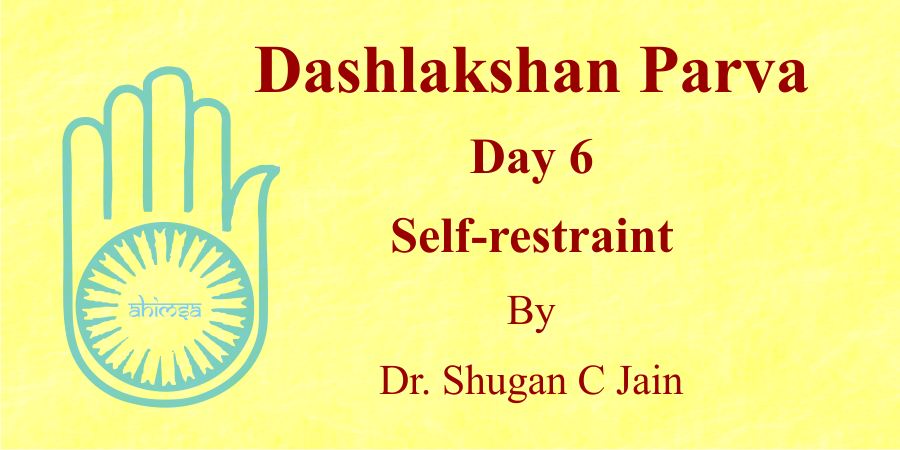Birth as human beings is the highest blessing one can get. Only we, the human beings, can exercise self-restraint to achieve our objective. Look at mosquitoes who fly to light bulb and die due to their uncontrolled colour sense, fish get caught due to its uncontrolled taste sense, butterfly gets trapped in the flower due to its uncontrolled desire of enjoying the nectar, elephant getting caught in the pit due to his uncontrolled lust and on so. There are many distractions which lead you to forget self-restraint all the time. In our own lives, we see ourselves getting sick due to our uncontrolled urge to eat sweets. If we cannot exercise self-restraint on our sensual urges, we lose our right to be called human beings. We are not including anger, arrogance, deceit and greed here as these are totally undesirable and to be replaced by the practice of forgiveness, humility, straightforwardness, cleanliness and truthfulness discussed earlier.
Self-restraint means to reign our uncontrolled sensual urges (body, taste, smell, eyes and hearing primarily). The cover of Shrimad Bhagwat Gita carries a picture of five horses (each representing a sense type) being restrained by the charioteer/driver, i.e. Krishna. This picture beautifully describes the importance of exercising restraints on our sensual urges which are endless to be able to achieve our objective of being happy and self-reliant. In a way, we can say that self -restraint is the panacea of all our problems.
Restraint is the base for all the human activities of a person, like the brakes in the cars or boundary walls for a house or a field. A person practicing restraint is always content and is not overpowered by anger, pride, deception and greed. Without exercising restraint /or observing discipline, it is useless to wish for the attainment of good traits and happiness. Exercising restraint over the wandering nature of mind is the starting point to be practiced to focus on our objective. Poison kills once but unrestricted behavior kills every day.
Activities at point 1 are to be most preferred while activities at point 4 must be avoided. Results of activities at point 3 are known sooner than you know (reprimand from the person you are performing) while activity at point 2 is difficult to assess and shows the immaturity of the person performing the act. In short, one should be straightforward in his actions, preferably as indicated at point 1 above. To avoid point 2, one needs training and guidance in performing verbal and physical activities. The one who practices straightforwardness is always liked, while one who practices point 4 is never able to make a community of friends/ family.
To achieve our worldly goal, we have to interact with people in the form of a guru, family, colleagues and seniors, customers and suppliers, government, friends and so on to gain their patronage/support. They soon know your personality and either leave you as a result of your practicing points 3 and 4 or become your loyal friends as a result of your actions as per points 1 and 2 and result in enhancing your happiness.
Gandhi went to England to participate in the Round Table Conference with the British Monarchy for India’s independence. There he met political dignitaries. Gandhi was asked to tell the qualities of a good leader. Gandhi said, ‘to exercise control over self and to remember TRUTH at every step’.
Let us now see how it is practiced in different life situations:
In the family: To be honest and exercise equality with all members. Let the rights/likes of each family member be heard and respected rather than impose just your own likes/prejudices. But remember, rights come with duties first. Share scarce/limited resources with all rather than keep for yourself.
In school/college: Concentrate on learning while in the class and not getting distracted by Bully or other miscreants.
In profession: Avoid excessive favours to some colleagues, taking time off excessively or causing work delays etc., overcharge for goods or services sold due to their scarcity.
Dealing with society, government: Observe rules as far as possible. Like curbing the urge to overspeed the car which will be punished either by fines or even cancellation of your driving license or an unfortunate accident.
Lifestyle: We shall understand these through some examples:
Avoid addiction to TV, social media, food and drinks, laziness and not attending to your normal duties assigned etc. Avoid authoritative impositions of your prejudices on youngsters or partners. Similarly, youngsters should exercise restraint in their communications with elders. Self-restraint is essential in our acquisition-consumption-wastage and possessions of things, unnecessary travel and killing of living beings to minimise the ill effects of environment pollution, global warming and lifestyle diseases like stress, diabetes, etc.

